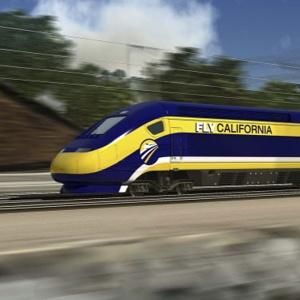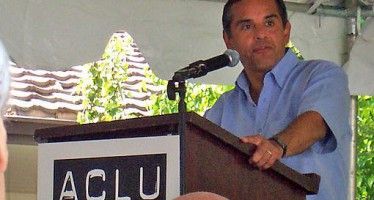Report on massive cost overrun may be turning point for troubled bullet train
 Despite Gov. Jerry Brown’s full-throated defense of the troubled bullet train project in his State of the State speech Thursday in Sacramento, a consultant’s report warning of a huge cost overrun on the project’s first segment in the Central Valley could end up a turning point in the high-speed rail saga.
Despite Gov. Jerry Brown’s full-throated defense of the troubled bullet train project in his State of the State speech Thursday in Sacramento, a consultant’s report warning of a huge cost overrun on the project’s first segment in the Central Valley could end up a turning point in the high-speed rail saga.
The cost of the 119-mile segment was originally estimated at $6 billion. But the main consulting firm on the project, WSP (formerly Parsons Brinckerhoff), told the California High-Speed Rail Authority’s board at a recent meeting that it was now projected at $10.6 billion – a 77 percent increase.
The fact that the overrun was so high on the part of the statewide project with the least-challenging geography appeared to startle some rail authority board members and some Democratic state lawmakers.
On Tuesday, Assemblyman Jim Patterson, R-Fresno – a longtime bullet train skeptic – was joined by Sen. Jim Beall, D-San Jose, in a letter asking for a formal state audit of the $67 billion project. Beall is chairman of the Senate transportation committee.
The letter was sent to Assemblyman Al Muratsuchi, the Torrance Democrat who chairs the Joint Legislative Audit Committee. It has the authority to direct state Auditor Elaine Howle to audit the bullet-train project without the blessing of the governor, who in 2016 vetoed a bill that would have increased oversight of the project and the rail authority. Previous calls for an audit have been blocked by Democratic lawmakers.
While the bullet train has been regularly scrutinized by the nonpartisan Legislative Analyst’s Office, its reports tend to note problems without offering harsh criticisms or sweeping judgments.
State audit could influence vote on June bullet-train ballot measure
By contrast, Howle takes no prisoners if she believes she has evidence of incompetent management, deceit or secrecy. In the past two years, her scathing criticism of the University of California over admissions policies that more than tripled out-of-state students at UC campuses and over UC President Janet Napolitano’s aides’ interference with her office’s attempts to gather information led to admission policy changes and to a state law barring such interference by state agencies.
If the state auditor was directed to review the bullet train project in coming weeks and completes her report faster than usual, it could affect a bullet train-related measure on the June primary ballot.
Last July, then-Assembly Republican leader Chad Mayes of Yucca Valley agreed to help Democrats round up enough GOP votes to extend the state’s cap-and-trade program until 2030 in return for the Legislature ordering the placement of a Mayes-drafted constitutional amendment before state voters in the primary.
If it won approval, the amendment would mandate that in 2024, the Legislature must have an up-or-down vote on whether to continue allowing the state government to use cap-and-trade revenue on the bullet train – with a two-thirds threshold for approval in both the Assembly and Senate.
Cap-and-trade auction funds are the only firm source of revenue the rail authority will have after spending the remaining $10 billion in funds left from a $3.3 billion grant from the Obama administration and the original $9.95 billion in state bond funds that voters approved for the project in 2008.
Cutting off the bullet train’s access to cap-and-trade dollars could kill the project without it ever having carried a passenger – leaving a massive white elephant in the Central Valley. Even before the overrun was reported, authority officials said in 2016 that they didn’t have enough money to build their planned segment linking San Jose with Bakersfield. Officials told a U.S. House subcommittee hearing that the project’s eastern terminus would be an almond orchard about 30 miles northwest of Bakersfield.
Chris Reed
Chris Reed is a regular contributor to Cal Watchdog. Reed is an editorial writer for U-T San Diego. Before joining the U-T in July 2005, he was the opinion-page columns editor and wrote the featured weekly Unspin column for The Orange County Register. Reed was on the national board of the Association of Opinion Page Editors from 2003-2005. From 2000 to 2005, Reed made more than 100 appearances as a featured news analyst on Los Angeles-area National Public Radio affiliate KPCC-FM. From 1990 to 1998, Reed was an editor, metro columnist and film critic at the Inland Valley Daily Bulletin in Ontario. Reed has a political science degree from the University of Hawaii (Hilo campus), where he edited the student newspaper, the Vulcan News, his senior year. He is on Twitter: @chrisreed99.
Related Articles
De Leon ‘green jobs’ vow didn’t pan out for Obama, Brown
New Senate President Kevin De Leon’s announcement Friday that creating a broad swath of “green jobs” would be a priority
2011 pension fixes in L.A., San Francisco not working
Earlier this decade — before Gov. Jerry Brown launched his successful 2012 push for state pension reforms in Sacramento —
Media Booted From GOP Convention
Katy Grimes: Just a few minutes ago at the Republican party convention in Sacramento, as convention guests began filling the




